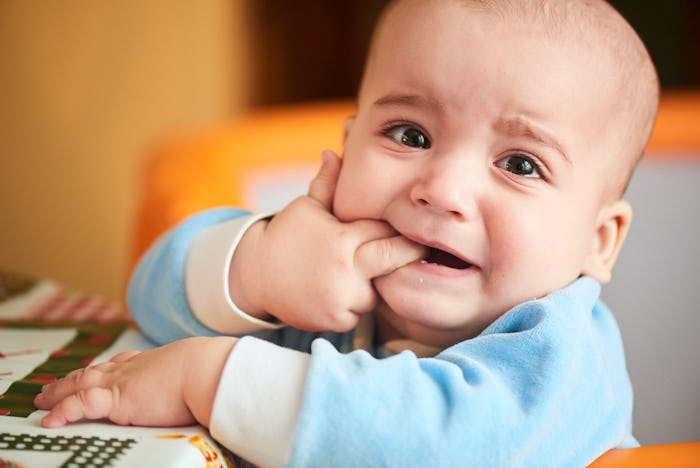Life

So Apparently Everything You Knew About Teething & Fevers Is A Lie, According To Experts
Desperately trying to comfort a teething baby (usually in vain) is an experience all parents are familiar with. To grow those little chompers, babies obviously have to endure the discomfort of fangs breaking through gums, but it can be awfully hard to sit through it as an empathetic mom or dad. The sad times are doubled when side effects start manifesting as well. For generations, parents like myself have sworn that seemingly unrelated things such as diarrhea, congestion, and fevers can be due to teething. But how high do teething fevers get? At what point should you consider other possible causes for a spiked temp? I asked a few pediatricians to find out, and their answers surprised me.
Dr. Eboni Hollier of Houston, board-certified in Developmental and Behavioral Pediatrics as well as General Pediatrics, tells Romper that "While many parents note that their child feels warm to the touch or has a low-grade fever, teething does not actually cause fever." Hollier defines a measured fever as a temperature above 100.4 degrees Fahrenheit, and tells Romper that the presence of such fever is due to a cold or other illness, not to teething.
If a fever isn't actually a symptom, how can parents tell if their baby is teething? According to Hollier, the telltale signs are increased drooling and fussiness. And at the risk of playing Captain Obvious, you can often see or feel the tooth buds pushing through your baby's gums.
"If after a day or two your child continues to feel warm to the touch and seems to be getting worse with symptoms such as increasing fussiness and decreased eating and activity level, he or she may be experiencing an illness rather than just teething," Hollier explains. "To help with symptoms thought to be due to teething, parents can give an appropriate dose of acetaminophen. Also consider offering a cool teething ring or frozen breast milk cube for infants and Popsicles for toddlers to help provide relief."
That's all well and good, but I for one have long been convinced that teething and fevers go hand-in-hand in my children, and I know other parents feel the same. So for good measure, I reached out to another medical professional for her take on the matter.
But Dr. Bande Virgil of Atlanta, board-certified in pediatrics, only confirmed that my assumptions had been wrong. "A fever is not a hallmark of teething, although many parents do find a concurrent elevated temperature when their child is teething," Virgil tells Romper in an exclusive interview. "It is very important to distinguish that from a child being ill."
Virgil agreed with Hollier that any temperature above 100.4 degrees Fahrenheit should have parents thinking about either a viral or bacterial cause. "A child that has a temperature of 100.4 and looks very sick should absolutely be evaluated for more than just teething," she emphasizes. Accompanying symptoms that warrant a medical exam include coughing, difficulty breathing, foul smelling urine, and inability to drink fluids.
Virgil's last piece of advice is to seriously take the baby's age and vaccine status into consideration when debating about whether or not to schedule an appointment. "The younger a baby, and the less vaccines they have had, the more we should be considering fever from other causes than teething," she advises.
It looks like I was wrong about those teething side effects I have sworn by for so long. In the future, I'll be more attuned to the possibility of illness in my babies — keeping an especially careful eye on that 100.4 mark. And just maybe cueing up some good Netflix binges for all those sleepless nights.
Check out Romper's new video series, Romper's Doula Diaries:
Watch full episodes of Romper's Doula Diaries on Facebook Watch.